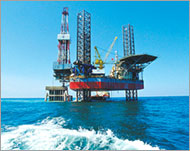Opec and China plan oil dialogue
Opec’s president has said the group had very successful meetings with Chinese officials during its first official trip to China, the world’s fastest-growing energy consumer.

Both sides agreed to meet regularly in future, Sheikh Ahmad Fahad al-Ahmad Al-Sabah said on Thursday.
He said the Organisation of Petroleum Exporting Countries believes that China’s demand is now “stable” and “reasonable”, although he was given no specific demand figures from the Chinese side.
Al-Sabah said Opec projects Chinese demand in 2006 to increase by 350,000 barrels a day.
The two sides agreed to begin holding regular technical and ministerial meetings to discuss production, demand and fair pricing.
As with much of the oil industry, Opec had largely underestimated the strength of China’s demand growth in the past two years.
Major factor
Chinese demand has been a significant factor behind rising oil prices, especially in 2004 and somewhat in 2005.
Al-Sabah, who is also Kuwait’s oil minister, said he hoped to have a final deal by March between Kuwait and PetroChina Co Ltd, the state-owned oil company, to build a refinery in the southern city of Guangzhou.
The $3 billion-$4 billion project would aim for an output of 350,000 barrels a day, he said.
 |
|
China’s oil production meets only |
Kuwait is also looking at a second big refinery project in China, Al-Sabah said, but gave no details.
Kuwait, which has the world’s fourth-largest oil reserves, wants to expand its presence in China. Kuwait Petroleum Corp, a state-run organisation, established a representative office in Beijing in March.
As head of the Opec delegation, Al-Sabah met Ma Kai, chairman of China’s National Development and Reform Commission.
Al-Sabah arrived in Beijing on Thursday and planned to visit Guangzhou before heading to Russia. Beijing releases production and trade statistics each month, but not inventory data.
China is the world’s second-biggest consumer of oil and third-biggest importer.